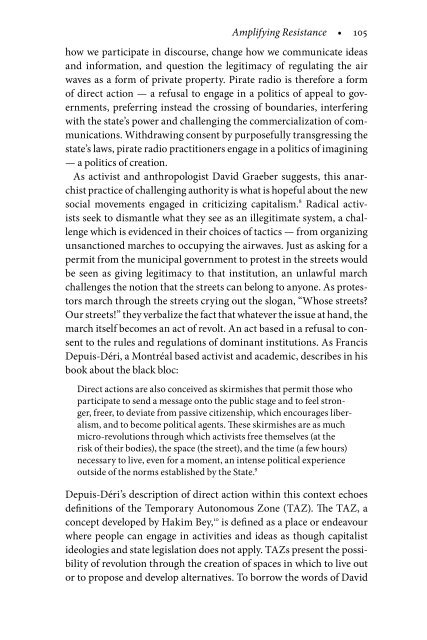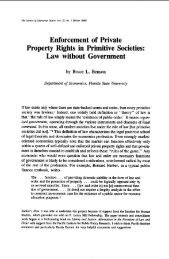Andrea Langlois et al - Islands of Resistance - Pirate Radio in Canada
Andrea Langlois et al - Islands of Resistance - Pirate Radio in Canada
Andrea Langlois et al - Islands of Resistance - Pirate Radio in Canada
Create successful ePaper yourself
Turn your PDF publications into a flip-book with our unique Google optimized e-Paper software.
Amplify<strong>in</strong>g <strong>Resistance</strong> • 105<br />
how we participate <strong>in</strong> discourse, change how we communicate ideas<br />
and <strong>in</strong>formation, and question the legitimacy <strong>of</strong> regulat<strong>in</strong>g the air<br />
waves as a form <strong>of</strong> private property. <strong>Pirate</strong> radio is therefore a form<br />
<strong>of</strong> direct action — a refus<strong>al</strong> to engage <strong>in</strong> a politics <strong>of</strong> appe<strong>al</strong> to governments,<br />
preferr<strong>in</strong>g <strong>in</strong>stead the cross<strong>in</strong>g <strong>of</strong> boundaries, <strong>in</strong>terfer<strong>in</strong>g<br />
with the state’s power and ch<strong>al</strong>leng<strong>in</strong>g the commerci<strong>al</strong>ization <strong>of</strong> communications.<br />
Withdraw<strong>in</strong>g consent by purposefully transgress<strong>in</strong>g the<br />
state’s laws, pirate radio practitioners engage <strong>in</strong> a politics <strong>of</strong> imag<strong>in</strong><strong>in</strong>g<br />
— a politics <strong>of</strong> creation.<br />
As activist and anthropologist David Graeber suggests, this anarchist<br />
practice <strong>of</strong> ch<strong>al</strong>leng<strong>in</strong>g authority is what is hopeful about the new<br />
soci<strong>al</strong> movements engaged <strong>in</strong> criticiz<strong>in</strong>g capit<strong>al</strong>ism. 8 Radic<strong>al</strong> activists<br />
seek to dismantle what they see as an illegitimate system, a ch<strong>al</strong>lenge<br />
which is evidenced <strong>in</strong> their choices <strong>of</strong> tactics — from organiz<strong>in</strong>g<br />
unsanctioned marches to occupy<strong>in</strong>g the airwaves. Just as ask<strong>in</strong>g for a<br />
permit from the municip<strong>al</strong> government to protest <strong>in</strong> the stre<strong>et</strong>s would<br />
be seen as giv<strong>in</strong>g legitimacy to that <strong>in</strong>stitution, an unlawful march<br />
ch<strong>al</strong>lenges the notion that the stre<strong>et</strong>s can belong to anyone. As protestors<br />
march through the stre<strong>et</strong>s cry<strong>in</strong>g out the slogan, “Whose stre<strong>et</strong>s?<br />
Our stre<strong>et</strong>s!” they verb<strong>al</strong>ize the fact that whatever the issue at hand, the<br />
march itself becomes an act <strong>of</strong> revolt. An act based <strong>in</strong> a refus<strong>al</strong> to consent<br />
to the rules and regulations <strong>of</strong> dom<strong>in</strong>ant <strong>in</strong>stitutions. As Francis<br />
Depuis-Déri, a Montré<strong>al</strong> based activist and academic, describes <strong>in</strong> his<br />
book about the black bloc:<br />
Direct actions are <strong>al</strong>so conceived as skirmishes that permit those who<br />
participate to send a message onto the public stage and to feel stronger,<br />
freer, to deviate from passive citizenship, which encourages liber<strong>al</strong>ism,<br />
and to become politic<strong>al</strong> agents. These skirmishes are as much<br />
micro-revolutions through which activists free themselves (at the<br />
risk <strong>of</strong> their bodies), the space (the stre<strong>et</strong>), and the time (a few hours)<br />
necessary to live, even for a moment, an <strong>in</strong>tense politic<strong>al</strong> experience<br />
outside <strong>of</strong> the norms established by the State. 9<br />
Depuis-Déri’s description <strong>of</strong> direct action with<strong>in</strong> this context echoes<br />
def<strong>in</strong>itions <strong>of</strong> the Temporary Autonomous Zone (TAZ). The TAZ, a<br />
concept developed by Hakim Bey, 10 is def<strong>in</strong>ed as a place or endeavour<br />
where people can engage <strong>in</strong> activities and ideas as though capit<strong>al</strong>ist<br />
ideologies and state legislation does not apply. TAZs present the possibility<br />
<strong>of</strong> revolution through the creation <strong>of</strong> spaces <strong>in</strong> which to live out<br />
or to propose and develop <strong>al</strong>ternatives. To borrow the words <strong>of</strong> David



